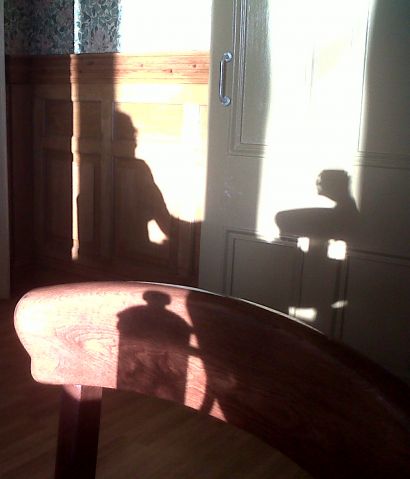‘… Milky Way You Will Hear Me Call …’
Exhibition and talk event: Wild Pansy Press Project Space, University of Leeds 15 October 2012
I wanted to write about attending this event in the context of generosity and gift for a number of reasons. At a time when I was (and am) struggling with articulating my own work, and feeling an aversion to finding words for what I do, this event was an affirmative, generous experience of artists sharing practice. It made me reconsider the worth of the sometimes painful struggle to articulate practice and this I consider a gift.
I became aware of ‘… Milky Way You Will Hear Me Call …’ from Emma Bolland, a Leeds based artist who I followed on Twitter but who had not met until the talk event. Over Twitter, we had discovered a shared admiration for Werner Herzog and this had led to a postal exchange of Herzog and Tarkovsky DVDs. Anyone who loves Herzog I automatically consider a kindred spirit, so when Emma began posting about the project I checked it out.
From the website:
‘… Milky Way You Will Hear Me Call …’ is a collaborative project by visual artist Emma Bolland, Photographer Tom Rodgers and curator Judit Bodor. The project began with the collective reading of David Peace’s ‘1980’, a novel which re-imagines the hunt for Peter Sutcliffe, the ‘Yorkshire Ripper’ of late 1970s/1980s West Yorkshire. Through visits to key sites described in the novel, the project explores memories, resonances and interpretations of a real and mythologised recent history. Using performative research and meditative documentation of sites and texts the project also seeks to investigate creative and collaborative processes, and the blurring of the boundaries between visual practice, curatorial intervention, research, documentation, fictional and theoretical writing’
I was pulled in by Emma’s poetic communications and Tom’s beautifully ambiguous black and white photographs on the website. I became intrigued by a number of aspects of the project; the nature of the collaborative process between curator, artist and photographer, its open-ended-ness, the performative aspects, and the use of a fictional account of a series of real events as a basis for the work. I was also very interested in the description of judit’s role as a creative one, which made me want to know more about her curatorial practice.
Prior to the exhibition and event on responding to an open offer on Twitter of free print work I received a stunning poster of text and image on the project to date. This made my mind up – I needed to go to the talk.
The event began with Emma, who talked both eruditely and accessibly about the origins, references and starting points for the collaboration, followed by Tom (Judit was ill unfortunately). The time was split evenly – an hour of presentations, and an hour of questions, discussions.
I was struck by the way with which both Emma and Tom approached the event. There was an open-ness and honesty, coupled with an active engagement with the participants to explore ideas and questions around the project. Doubt, ambivalence were expressed as well as confidence and belief. The sense of intensity and close attention from both artists and attendees was almost palpable – a roomful of people talking, listening, exchanging. There was no feeling of hierarchy or superior knowledge or bestowal. This was a genuine and reciprocal exchange. A gift.
This experience has worked on me in a number of ways. As well as illuminating my understanding of the project (regretfully there isn’t enough room to talk in any detail here) attending the talk has re-instated my belief in the value of artist talks, and encourages me to aim for this quality of exchange in future discussions about my own practice
Lewis Hyde discusses the need for a gift to continually circulate throughout a society in order to keep its ‘gift’ qualities ‘The gift must stay in motion’. I hope that naming and recognising the transformative generosity of this encounter has helped to move this particular gift along.
Thank you to Emma Tom and Judit.
To find out more about the ‘… Milky Way You Will Hear Me Call …’ visit http://youwillhearmecall.wordpress.com/



